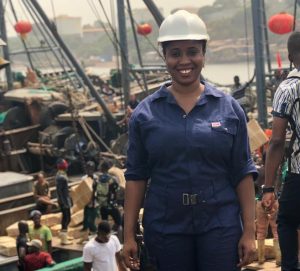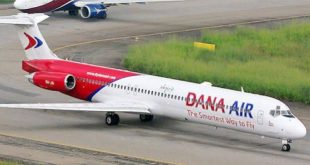
- WIMAfrica calls for sustainable African oceans
By Kenneth Jukpor
A young Sierra Leonean female seafarer, Regina Conteh-Khali, shared her heart-warming story of how African Women in Maritime (WIMAfrica) gave her an opportunity to be back at sea with the Sea Shepherd shipping company.

The Sea Shepherd is mainly concerned with efforts at stopping illegal fishing for countries and to secure seafarers for bigger vessel owners.
Few months ago, Conteh-Khali responded to a call by the Continental President (CP) of WIMAfrica, Barr. (Mrs.) Jean-Chiazor Anishere, for members who are seafarers to send in their curriculum vitae.

Her new journey began when the shipping company contacted her and offered her the job at sea.

She shared her experience in gratitude saying: “A few months ago our CP asked the female seafarers in this group to send their CVs. Being a Seafarer, I sent my CV to her, because I had stopped going to sea for a while as there were no shipping companies recruiting seafarers in my country anymore.
“Getting a vessel or company to hire seafarers in Sierra Leone is challenging, not just for women. A lady called Bea (the crew coordinator for Sea Shepherd) contacted me some weeks ago and today we had a video session. She has offered me a job and I am so excited.
“Thank you so much CP, I am grateful to you and every other woman working tirelessly to empower women in the maritime industry. It is still my dream to become the first female captain in Sierra Leone and you have just made that possible for me. I’m happy to go back to sea.”
On her part, an elated the WIMAfrica President said connecting with Capt. Peter Hammardstedt, the Director of Campaigns in Sea Shepherd, at a Blue Economy Conference in Tunisia, gave the opportunity for discussions on the need for job placement for WIMAfrica’s members who needed jobs at sea.
She said: “He told me to send him their names and certificates; which I did. I sent him over 60 names and certificates from nine African countries, who are members of WIMAfrica, Nigeria inclusive. So we are hopeful that we will get more of our girls on board ships soon.”
Conteh-Khali’s experience matches the 2019 World Maritime Day focus of “Empowering Women in the Maritime Community.”
In another development, while delivering a paper at the recent regional consultative workshop in Kenya, Anishere supported the need for an all-inclusive approach to create awareness and get communities involved.
She said: “It is increasingly important to gather as a scientific community to raise awareness of the truly global dimension of the ocean, address environmental challenges, and set forth on a path towards a resilient planet.”
She noted that the vast resources of the oceans were fast depleting also due to the increased population of people living closer to the ocean, and by default polluting the oceans as their daily activities cause them to generate waste and very likely, not manage such waste appropriately.
“Today, more than 40% of the global population lives in areas within 200 km of the ocean and 12 out of 15 mega cities are coastal. Doubling of the world population over the last 50 years, rapid industrial development, and growing human affluence are exerting increasing pressure on the ocean.
“Climate change, non-sustainable resource extraction, land-based pollution, and habitat degradation are threatening the productivity and health of the ocean,” she said.
The WIMAfrica President, in her presentation, remarkably noted that “The most challenging ocean pollutants include: atmospheric carbon dioxide, which causes climate change, ocean warming, ocean acidification, and sea level rise; agricultural fertilizers, which lead to increased primary production but result in ocean deoxygenation; untreated waste water; invasive species; micro and macro plastics, the exponential increase of which has an environmental impact as yet only partially known.”
The focus of the Decade of the Ocean Science, according to her, would be for the scientists working with decision-makers and society to establish new knowledge from their assessment of the human and environmental risks of types of pollution to the ocean and share information on new ways to reduce the pressure on the ocean.
 MMS PLUS NG – Maritime, Aviation, Business, Oil and Gas News Online Newspaper with coverage in Maritime, Oil and Gas, Aviation, Power and Energy as well as Financial News
MMS PLUS NG – Maritime, Aviation, Business, Oil and Gas News Online Newspaper with coverage in Maritime, Oil and Gas, Aviation, Power and Energy as well as Financial News









